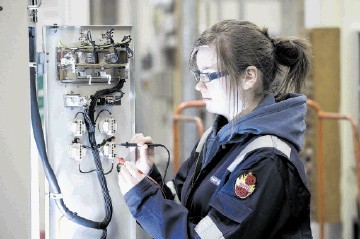
The Scottish Government has increased its target for new apprentices to 28,000 and announced extra funds for key areas including dental nursing and management.
Minister for Employability and Training Jamie Hepburn revealed the 2018/19 target during a Holyrood debate as well as changes to rural supplement eligibility.
The figure marks a 1,000 increase on the 2017/18 target, set after the 2016/17 goal of 26,000 places was exceeded.
Mr Hepburn announced additional support for training costs for apprenticeships in social services for children and young people, dental nurses and management, with increases ranging from £600 to £1,700.
The rural supplement, brought in last year to help offset the cost of apprenticeships in the countryside, moves from a blanket application in 10 local authority areas to applying to all employers with a postcode classed by the government as remote rural or remote small town.
Orkney, Shetland, the Western Isles and Argyll and Bute retain blanket coverage, along with Arran.
Mr Hepburn said the changes would help rural communities gain better access to modern apprenticeships.
He added: “An apprenticeship offers a fantastic opportunity to learn new skills while earning and gives employers the chance to grow their own talent while building a highly skilled workforce.
“We remain focused on our commitment to increase new apprenticeship starts to 30,000 per year by 2020.”
Conservative education spokesman Liz Smith said some employers reported spending a “considerable” amount of money boosting the numeracy and literacy skills of school leavers as they are lacking.
She urged the government to move towards a more diverse education system with more opportunities for vocational training, adding: “Vocation training is not only the right thing to do for our young people but it’s the right thing to do for our economy.”
Labour’s Iain Gray said the government should be more rigorous about how success was measured and stop counting a zero-hours contract as a “positive” destination for school leavers.
“We have to face up to how many young people are in temporary, insecure, part-time or zero-hour jobs,” he said.
“UK-wide 36% of zero-hour contracts are filled by young people. If it’s the same proportion here that would mean 25,500 in Scotland.
“We count this as a positive destination but it is not. This is not developing the young workforce – it is exploiting them. It is not opportunity, it is alienation.”
Lib Dem Tavish Scott renewed calls for the national skills agency Skills Development Scotland to be decentralised.
He said he made the argument “not on the basis of any political points but rather because I think there is a really serious case for supporting young people with a more flexible, adaptable and closer system of support and one that potentially saves some money as well”.
Recommended for you
